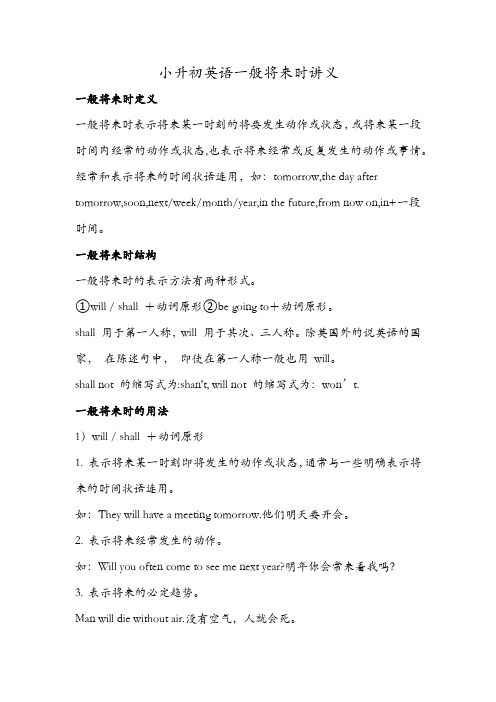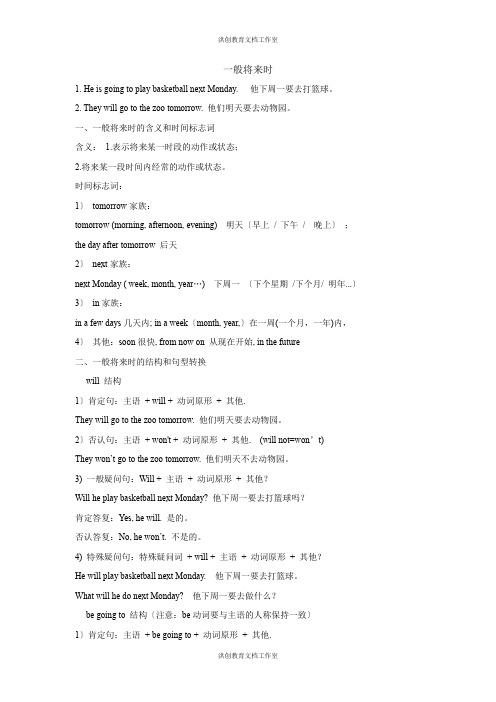小升初语法之一般将来时
(完整)小升初英语一般将来时

一般将来时1、定义:一般将来时表示将来某个时间要发生的动作或存在的状态2、结构:主语+will\shall\be going to+v(动词原形)+其他例如:It is going to rain. 要下雨了。
We are going to have a meeting today. 今天我们准备开一个会。
Tomorrow will be Sunday. 明天就是星期天。
The rain will stop soon. 雨很快就要停了。
I shall not go. 我不准备去了。
What shall we do for summer holiday?暑假我们做什么呢?注意:a.will用于所有人称,shall用于第一人称(we.I)b. will 常简略为'll,并与主语连写在一起,如:I'll,he'll,it'll,we'll,you'll,they'll。
c. 一般疑问句如用will you…?其简略答语须是Yes,I will 或No,I won't;3、时间标志:常常和表示将来的时间状语连用。
如:tomorrow(明天),next week(下周),from now no(从现在开始),in the future(将来),soon, in 2015, in two days(两天之后)等。
四种句式:1. be going to +动词原形1.肯定句主语+be(am /,is,/ are) going to +动词原形+其它My sister is going to learn English n ext year. 我姐姐准备明年学英语。
2.否定句主语+be(am / is / are)not going to +动词原形+其它I am not going to(go to)the cinema tonight. 我今天晚上不打算去看电影。
小升初英语一般将来时be going to与will用法单选题40题

小升初英语一般将来时be going to与will用法单选题40题1. I ______ play football tomorrow.A. am going toB. willC. amD. was答案:A。
本题考查一般将来时的用法。
“be going to”表示计划、打算做某事,通常有某种迹象表明要发生某事;“will”表示单纯的将来,没有事先计划。
根据题意,“我明天打算踢足球”,有计划的意味,所以用“am going to”,B 选项“will”没有体现出计划,C 选项“am”时态不对,D 选项“was”是过去式,不符合明天的语境。
2. They ______ have a picnic this weekend.A. am going toB. willC. are going toD. were答案:C。
“they”是复数,be 动词用“are”,A 选项“am going to”用于第一人称I,B 选项“will”没有体现出计划,D 选项“were”是过去式,不符合本周末的语境。
所以选C,“are going to”表示他们本周末打算去野餐。
3. My sister ______ visit her friend next week.A. is going toB. willC. was going toD. is答案:A。
“next week”表明是将来的时间,“my sister”是第三人称单数,用“is going to”,B 选项“will”没有体现出计划,C 选项“was going to”是过去将来时,不符合,D 选项“is”时态不对。
所以选A,意思是我姐姐下周打算拜访她的朋友。
4. We ______ see a film tonight.A. are going toB. willC. wereD. are答案:B。
“tonight”今晚,A 选项“are going to”表示有计划,此处没有强调计划,用“will”更合适,C 选项“were”是过去式,D 选项“are”时态不对。
【口袋书】小升初英语语法知识点-一般将来时讲义(全国通用版)

小升初英语一般将来时讲义一般将来时定义一般将来时表示将来某一时刻的将要发生动作或状态,或将来某一段时间内经常的动作或状态,也表示将来经常或反复发生的动作或事情。
经常和表示将来的时间状语连用,如:tomorrow,the day after tomorrow,soon,next/week/month/year,in the future,from now on,in+一段时间。
一般将来时结构一般将来时的表示方法有两种形式。
①will / shall +动词原形②be going to+动词原形。
shall 用于第一人称,will 用于其次、三人称。
除英国外的说英语的国家,在陈述句中,即使在第一人称一般也用will。
shall not 的缩写式为:shan't, will not 的缩写式为:won’t.一般将来时的用法1)will / shall +动词原形1.表示将来某一时刻即将发生的动作或状态,通常与一些明确表示将来的时间状语连用。
如:They will have a meeting tomorrow.他们明天要开会。
2.表示将来经常发生的动作。
如:Will you often come to see me next year?明年你会常来看我吗?3.表示将来的必定趋势。
Man will die without air.没有空气,人就会死。
2)be going to +不定式,表示将来。
"be going to"中的be是助动词,它有am, is, are三种形式,没有什么实际意义;to是动词不定式的标志词,标志词后动词用原形。
它们三个总是形影不离,在句中共同表达"方案、打算、预备去做……"的意思。
a. 主语的意图,即将做某事。
例如:What are you going to do tomorrow? 明天打算作什么呢?b. 方案,支配要发生的事。
小升初英语语法句型转换-一般将来时(全国通用版)

am going to go
will go
1.I am tired. I __________
(go) to bed early
tonight.
2.Mary’s birthday is next Monday. Her brother
_____________(give)
her a present.
(2)否定句:
主语+ be + not going to +动词原形+其他.
如:
I am not going to plant trees this weekend. 这个周
末我不打算去种树。
They aren’t going to climb mountains this week.
这周他们不打算去爬山。
下周你们要去做什么?
—We will have a picnic in the park.
我们将去公园野餐。
一般将来时的用法
1. 时间标志词:
1⃣️tomorrow系列
2⃣️next系列
3⃣️in the future
4⃣️in+一段时间 等表示将来的时间状语。
如:
We will go to Shanghai next week.
week.(改否定)
won’t
go
Shirley ____ ____ to visit her grandma next
week.(改否定)
练习
We will hold a meeting this evening.(改一般疑
问句)
you
Will
____ ____ hold a meeting this evening?
专题10 一般将来时_备战2021年小升初英语必考语法和题型(解析版)

专题10 一般将来时一、一般将来时的概念一般将来时表示将来某个时间要发生的动作或存在的状态。
如:I am going to play football tomorrow.我明天打算去踢足球。
Amy will be 12 years old next year. 艾米明年计12岁了。
There will be a football match in our school next week. 我们学校下周将举行一场足球比赛。
二、一般将来时的动词结构①主语+be going to + 动词原形+其它。
②主语+will + 动词原形+其它。
三、一般将来时的句式结构1. 含有be going to的句型(1) 肯定句:主语+ be going to +动词原形+其他。
如:I'm going to have a picnic this afternoon. 今天下午我将要去野餐。
(2) 否定句:主语+be+ not going to +动词原形+其他。
如:I'm not going to have a picnic this afternoon. 今天下午我将不去野餐。
(3) 一般疑问句:Be +主语+ going to +动词原形+其他?肯定回答:Yes, 主语+be.否定回答:No, 主语+ be + not. 如:例:I am going to have a picnic this afternoon. 我今天下午要去野餐。
(改为一般疑问句并作回答) —Are you going to have a picnic this afternoon? 你今天下午将要去野餐吗?—Yes, I am. 是的,我要去。
—No, I’m not. 不,我不去。
(4) 特殊疑问句:特殊疑问词+一般疑问句?What are you going to do tomorrow? 你明天将要去做什么?例:Sam is going to have a birthday party this Friday. 山姆这周五将有一个生日派对。
小升初英语语法专题精讲学案 一般将来时(含答案)

一般将来时1. He is going to play basketball next Monday. 他下周一要去打篮球。
2. They will go to the zoo tomorrow. 他们明天要去动物园。
一、一般将来时的含义和时间标志词含义:1.表示将来某一时段的动作或状态;2.将来某一段时间内经常的动作或状态。
时间标志词:1〕tomorrow家族:tomorrow (morning, afternoon, evening) 明天〔早上/ 下午/ 晚上〕;the day after tomorrow 后天2〕next家族:next Monday ( week, month, year…) 下周一〔下个星期/下个月/ 明年...〕3〕in家族:in a few days几天内; in a week〔month, year,〕在一周(一个月,一年)内,4〕其他:soon很快, from now on 从现在开始, in the future二、一般将来时的结构和句型转换will 结构1〕肯定句:主语+ will + 动词原形+ 其他.They will go to the zoo tomorrow. 他们明天要去动物园。
2〕否认句:主语+ won't + 动词原形+ 其他. (will not=won’t)They won’t go to the zoo tomorrow. 他们明天不去动物园。
3) 一般疑问句:Will + 主语+ 动词原形+ 其他?Will he play basketball next Monday? 他下周一要去打篮球吗?肯定答复:Yes, he will. 是的。
否认答复:No, he won’t. 不是的。
4) 特殊疑问句:特殊疑问词+ will + 主语+ 动词原形+ 其他?He will play basketball next Monday. 他下周一要去打篮球。
小升初英语一般将来时 be going to 和 will 区别单选题40题
小升初英语一般将来时be going to 和will 区别单选题40题1.I ______ play football tomorrow.A.am going toB.willC.am goingD.go to答案:B。
本题考查一般将来时的用法。
A 选项“am going to”通常表示有计划、打算做某事;B 选项“will”更侧重于主观意愿;C 选项“am going”缺少“to”,不完整;D 选项“go to”是一般现在时,不符合题意。
本题中没有体现有计划地去踢足球,而是一种主观意愿,所以选B。
2.She ______ visit her grandparents this weekend.A.is going toB.willC.is goingD.goes to答案:A。
“this weekend”表明是将来的时间,A 选项“is going to”表示有计划地做某事;B 选项“will”也可以表示将来,但没有体现出计划;C 选项“is going”缺少“to”;D 选项“goes to”是一般现在时。
本题中说她这个周末要去看望祖父母,通常是有计划的行为,所以选A。
3.We ______ have a picnic if the weather is fine.A.are going toB.willC.are goingD.go to答案:B。
本题中如果天气好我们去野餐,这更多是一种主观意愿,不是有明确计划的行为,所以用“will”更合适。
A 选项“are going to”一般表示有计划;C 选项“are going”缺少“to”;D 选项“go to”是一般现在时。
所以选B。
4.He ______ buy a new book after school.A.is going toB.willC.is goingD.goes to答案:A。
放学后买新书通常是有一定计划的行为,所以用“is going to”更合适。
小升初英语一般将来时必考知识点
专题十五一般将来时一、一般将来时的用法将来某一时刻的动作或状态或将来某一时间内发生的事They will watch a film tomorrow.He is going to be a teacher in the future.I shall go shopping.★一般将来时的标志词tomorrow 明天next …下一个…in the future 将来later 以后the day after tomorrow 后天tonight 今晚this evening 今晚in ……以后二、一般将来时的构成1. I / We+shall+动词原形+其他eg. I shall buy a gift for my mother next month.下个月我将给我妈妈买一个礼物。
We shall have a party tonight. 我们今晚将要开聚会。
2. 主语+will+动词原形+其他eg. I will walk to the shop later. 我晚会将会走路去商店。
They will wash hands in two minutes. 他们两分钟之后将去洗手。
3. 主语+be going to+动词原形+其他eg. She is going to draw a picture in two hours. 她两小时之后将要画画。
I am going to play football next Friday. 我下周五要去踢足球。
三、一般将来时的基本句型结构①肯定句:I / We+shall+动词原形+其他. I shall take a bath.否定句:I / We+shall+动词原形+其他. I shall not take a bath.一般疑问句:Shall +I / we+动词原形+其他? Shall I take a bath?肯定回答:Yes, 主语+shall. Yes, I shall.否定回答:No,主语+shall not. No, I shall not.②肯定句:主语+will+动词原形+其他. She will sleep.否定句:主语+will not +动词原形+其他. She will not sleep.一般疑问句:Will+主语+动词原形+其他?Will she sleep?肯定回答:Yes, 主语+will. Yes, she will.否定回答:No, 主语+won’t. No, she won’t.will not= won’t③肯定句:主语+be going to +动词原形+其他. I am going to have dinner.否定句:主语+be not going to +动词原形+其他. I am not going to have dinner. 一般疑问句:Be+主语+going to+动词原形+其他?Are you going to have dinner? 肯定回答:Yes, 主语+be Yes, I am.否定回答:No, 主语+be not No, I’m not.四、句型转换做一般将来时的句型转换时,注意will和shall都是情态动词含有情态动词的句型转换做题步骤:①变否定句a. 找出情态动词注意:some变anyb. 情态动词后加not扩展:can not = can’t should not = shouldn’t②变一般疑问句a. 找出情态动词注意:一二人称互换b. 情态动词提前,其余照抄some变anyc. 句末加问号。
小升初英语语法:一般将来时详解析版
一般将来时强化练习第 1-50 题1.I the Great Wall next week.A.visit B.am going to visit C.visits下周我打算去参观长城。
A. 参观(动词原形);B. 参观(一般将来时结构);C.参观(三单式)。
根据时间词next week“下周”判断该句子是一般将来时,故选B。
2.My sister ___eat hot dogs tonight .A.are going to B.is going to C.does go to我的姐妹打算今天晚上吃热狗。
根据关键词tonight今天晚上可知,要表达一般将来时。
要使用be going to结构来表达。
主语My sister属于第三人称单数形式。
be动词要使用is。
故应选B。
3.What will happen your friend?A.at B.to C.for你的朋友将会发生什么?"sth happens to sb”表示某人发生某事,故选B。
4.—How many postcards do you need?—I'll ________ four, please!A.take B.taking C.takes—你需要几张明信片?—我将4张。
答语用一般将来时,构成will+动词原形,选项A 买,动词原形,选项B买,现在分词,选项C买,单三,故选A.5.There will a lot of trees and flowers around the playground.A.have B.are C.be操场周围会有很多树和花。
本句是there be句型的一般将来时,构成There will be+名词+其它。
故选C.6.Sally is going to the US with her parents ________.A.next summer holiday B.last winter莎莉要和父母一起去美国。
小升初英语——一般将来时
第二讲一般将来时一般将来时通常表示现在还没有发生,但将要发生的事情或动作如:It is going to rai n.要下雨了。
We are going to have a meeti ng today.今天我们准备开一个会。
Tomorrow will be Sun day.明天就是星期天。
I shall not go.我不准备去了。
What shall we do for summer holiday? 暑假我们做什么呢?语法精讲第一人称(I /we)+shall +动词原形I shall be there in five mi nutes.我五分钟后会到那里。
_________________________________________ 我们今晚去哪里?We shall probably go to Xi 'n for our holiday.我们很可能去西安度假。
2各人称单复数+ will +动词原形When will we know our test scores?我们什么时候能知道测验的分数?_______________________________________ 他明天要和他爸爸去钓鱼You will get sick if you eat too much.如果吃得太多了,你会生病的。
一般将来时的基本用法. __________________________________ /一般将来时常常和表示将来的时间状语连用。
如:tomorrow (明天),next week(下周),from now no(从现在开始),in the future(将来),soon, in 2015, in two days两天之后)等。
be going to+ do①第一人称单数(I)+ am going to + v (动词原形)+其他成分我打算今天下午去打篮球。
②第二人称单数(you)/各人称复数(we/you/they)+going to + v (动词原形)+其他成分You are going to have a pic nic with me tomorrow. 我们打算下午去爬山。
- 1、下载文档前请自行甄别文档内容的完整性,平台不提供额外的编辑、内容补充、找答案等附加服务。
- 2、"仅部分预览"的文档,不可在线预览部分如存在完整性等问题,可反馈申请退款(可完整预览的文档不适用该条件!)。
- 3、如文档侵犯您的权益,请联系客服反馈,我们会尽快为您处理(人工客服工作时间:9:00-18:30)。
一、一般将来时的定义和用法
一般将来时表示将要发生的动作或者情况,主要有一下几种表现形式:
1.will / shall+动词原形
(1)这种方法一般单纯地表示将来某个时间将要发生的动作或存在的状态,不涉及主语的主管意愿
Will用于各种人称;shall只用于第一人称。
例如:
I will/ shall go to visit him next week.
What time shall we go there tomorrow?
变形:
We shall study tomorrow.
→否定句:
→一般疑问句:
He will go to school next week.
→否定句:
→一般疑问句:
(2)Shall not 可以缩写成shan’t, will not可以缩写成won’t
Shall, will均可以缩写成’ll, 如,I shall = I’ll she will = she’ll
(3)与一般将来时连用的时间状语,它们通常是一些表示将来时间的词或者词组。
例如:tomorrow(明天),before long(不久),the day after tomorrow(后天),next week(下周),soon(很快),in the future(将来),in three days (3天后),someday(将来的某一天)
(4)在疑问句中,可以用will或shall征求对方意见或者询问一种情况。
例如:What shall I do?
Shall I open the window?
2.be going to+动词原形
(1)be going to 相当于一个助动词(其中be有人称和数的变化),它后面跟动词原形,用来表示近期将要发生的动作或存在的状态,以及计划、安排、打算要做的事情。
I am going to study tomorrow.
→否定句:
→一般疑问句:
He is going to play basketball next week.
→否定句:
→一般疑问句:
They are going to do homework together tomorrow.
→否定句:
→一般疑问句:
(2)这种结构还可以表示说话人根据已有的迹象认为非常可能即将发生某事。
例如:
I think it is going to snow.
I am afraid I am going to have a bad cold.
二、一般将来时的特殊疑问句形式及回答
I will leave for Beijing next week.
对主语提问:
对时间提问:
对地点提问:
三、there be句型的一般将来时
There will be +名词+其它成分,意为“将会有……”
肯定句:There will be a lesson soon.
否定句:There will not(=won’t) be a lesson soon.
一般疑问句:Will there be a lesson soon?
------Yes, there will.
------No, there won’t.
课后强化练习:
一、单选
1.There ______ a meeting tomorrow afternoon.
A will be going to
B will going to be
C is going to be
D will go to be
2.Charlie ______ here next month.
A isn’t working
B doesn’t working
C isn’t going to working
D won’t work
3.He ______ very busy this week, he ______ free next week.
A will be; is
B is; is
C will be; will be
D is; will be
4.There ______ a dolphin show in the zoo tomorrow evening.
A was
B is going to have
C will have
D is going to be
5.------______ you ______ free toworrow?
------No. I ______ free the day after tomorrow.
A Are; going to; will
B Are; going to be; will
C Are; going to; will be
D Are; going to be; will be
6.Mother ______ me a nice present on my next birthday.
A will gives
B will give
C gives
D give
7.------Shall I buy a cup of tea for you?
------______.(不,不要)
A No, you won’t.
B No, you aren’t.
C No, please don’t.
D No, please.
8.------Where is the morning paper?
------I ______ it for you at once.
A get
B am getting
C to get
D will get
9.______ a concert next Saturday?
A There will be
B Will there be
C There can be
D There are
10.If they come, we ______ a meeting.
A have
B will have
C had
D would have
11.He ______ her a beautiful hat on her next birthday.
A gives
B gave
C will giving
D is going to give
12.He ______ to us as soon as he gets there.
A writes
B has written
C will write
D wrote
13.He ______ in three days.
A coming back
B came back
C will come back
D is going to coming back
14.If it ______ tomorrow, we’ll go roller-skating.
A isn’t rain
B won’t rain
C doesn’t rain
D doesn’t fine
15.------Will his parents go to see the Terra Cotta Warriors tomorrow?
------No, ______.(不去)
A they willn’t
B they won’t
C they aren’t
D they don’t
二、填空
1.-- “I need some paper.”
--“I ______(bring ) some for you.”
2. ______ (be ) free tomorrow?
3. They ______( not leave) until you come back.
4. ______we ______(go) to the party together this afternoon?
5. They want to know when the meeting ______(start).
三、句型转换
1. The students will go to the zoo on Sunday.(变一般疑问句)
2.Mike will finish middle school in one year.(变否定句)
3.He’ll call you tonight.(对划线部分提问)
4.She will come to see us this weekend.(对划线部分提问)
5. I shall go to Shanghai tomorrow.(对划线部分提问)
四、将下列句子翻译成英文。
1. 明天他要到广州去。
2.我打算买一个玩具给我的小妹妹。
3.你们打算什么时候写作业?
4.她下周要去拜访王教授。
5.明年冬天将会下雪吗?。
